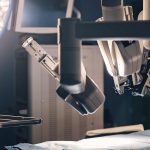Artificial intelligence is riddled with paradoxes. As if the subject is not ethically and technically complex enough, AI also proves challenging in terms of its many self-contradictions. For a technology ruled by logic, AI presents a series of illogical conflicts. Indeed, we're still grappling to define what AI is and what it means even as we develop and deploy it at a … [Read more...] about The Paradoxes in AI
Robotics
Robotics is becoming prevalent in our lives. It's crucial to understand its implications for the future of work. Discover all you need to know about robotics here.
What Does the Marriage of Data Analytics and Robotics Bring?
They say robots are conquering the world, and there is some truth in it. Statista expects the robotics market to grow at an annual rate of around 37.4%. If the trend remains, by 2025 the market size will reach almost 500 billion U.S. dollars. At the same time, data analytics is also looming large: according to BI consultants from Iflexion, the technology brings innovation to … [Read more...] about What Does the Marriage of Data Analytics and Robotics Bring?
What Is AI’s Role in Disease Prevention?
Hop on just about any website these days, and you are bound to meet a chatbot before you interact with a live human. Patients can log into Sensely, the company that partners with the Mayo Clinic, and enter their symptoms to receive self-care advice or a referral to care services just by chatting with the bot. Doctors also benefit from similar tech, with platforms offering quick … [Read more...] about What Is AI’s Role in Disease Prevention?
New IT Process Automation: Smarter and More Powerful
If we think of the newest trends in IT service automation, or try to follow the recent research, or listen to the tops speakers at conferences and meetups Š ” Šthey all will inevitably point out that automation increasingly relies on Machine Learning and Artificial Intelligence. It may sound like the case when these two concepts are used as buzzwords to declare that process … [Read more...] about New IT Process Automation: Smarter and More Powerful
Robots and AI aren’t coming for your job, just the boring parts of it
We extol the virtues of robots and AI quite a bit on this blog, and rightfully so; beyond serving as one of our competitive advantages in innovative solution design and development, it's also one of the most exciting frontiers in modern computer science (which at this point is to say, the modern world). But as with any level of automation, one of the first questions to … [Read more...] about Robots and AI aren’t coming for your job, just the boring parts of it
What is robotics?
Robotics refers to the branch of technology that deals with designing and operating robots. Robotics also deals with artificial intelligence — the ability of machines to carry out tasks that would normally require human intelligence, like understanding natural language and recognizing objects. Want to learn more about robotics? Datafloq has courses available. Contact us to get started.
What are robots used for?
Robots are used in industrial and commercial settings for welding, fabricating, testing, measuring, and inspection. In addition, they can work in dangerous or difficult environments that would otherwise be unsafe for human workers.
At home, robots are commonly used as vacuum cleaners, lawnmowers, and window cleaners. Some more advanced home robot models can also perform complex tasks such as making a bed or folding laundry. As technology continues to evolve, the number and variety of tasks robots can perform will likely continue to grow.
What are the different types of robots?
There are many different types of robots, each designed for a specific purpose. Some robots are designed for manufacturing tasks, such as welding or fabricating parts. Others are for logistics tasks, such as moving materials around a warehouse. There are also robots that are designed for domestic chores like vacuuming or mowing the lawn.
Each type of robot has its strengths and weaknesses, and the right type of robot for a given task will vary depending on the job’s specific requirements. When choosing a robot, it is important to carefully consider the capabilities of each type to ensure that the right tool is selected for the job at hand.
What are the advantages of robots?
Robots have many advantages over human workers. They can work faster, with more precision, and are not affected by environmental conditions. They can work 365 days a year without rest and don’t require breaks or vacations. Additionally, they are not affected by emotions or physical needs, so they can maintain peak performance at all times.
Robots can also be programmed to perform specific tasks, which helps minimize mistakes. Finally, the long-term costs involved with robots are more affordable, as there is no need for health insurance or other benefits. In short, robots offer several advantages over human workers, making them an attractive option for many businesses.
What is the future of robotics?
In the near future, robots will likely become increasingly commonplace in commercial and residential settings. One area where robots are already making an impact is the healthcare industry. Robots are being used to assist surgeons, transport patients, and dispense medication.
They are also being developed to provide companionship and care for the elderly and infirm. As robotics technology continues to advance, the scope of what robots can do is likely to expand even further. Ultimately, the future of robotics will likely be defined by the imagination of those who create them.







